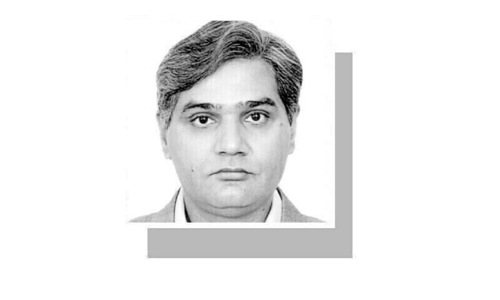KARACHI: The hike in the taxation target for the ongoing fiscal from Rs1.25 to Rs1.36 trillion under IMF directives has caused some concern in the services and retail sectors. Not exactly sleepless nights or nightmares, for they have seen it all many times over, but they are sure keeping an eye on the frequency of brainwaves within the FBR regarding how it plans to generate the additional Rs110 billion.
The sensitivity of the issue makes everyone — from service-sector practitioners to retailers to even the officials — seek anonymity. Director-General, Regional Tax Office, Karachi Asrar Rauf was not available for comments and in his absence no one was willing to come on record about how the department was planning to go about meeting the enhanced target.
However, the general sense one gets after talking to taxation officials suggests that the revised target may be difficult to meet by the time the fiscal comes to an end on June 30 next.
As one official pointed out, it will be difficult for a number of reasons. Regardless of factors behind the phenomenon, the last five to seven years did see the economic indicators showing an upward trend. It was during this very period that the government of the day brought certain changes in taxation laws in the name of facilitating the taxpayers that crippled the audit wing of the department and made it accept every return on face value.
The Income Tax department was relegated to such a position, said a taxation lawyer, that it was perhaps the only government entity where the level of corruption actually went down. That was wonderful news for the service and retail sectors which had no fears of a possible audit on their returns. The dreaded sword of Damocles was no more hanging on their heads and it was time to make merry.
It is not without reason that the tax-to-GDP ratio that was around 13 per cent back in the 1990s has now gone under 10; in the last fiscal it was 9.6. This was despite the fact that the average GDP growth during 2002-07 period was an impressive seven per cent. A sudden turnaround in terms of laws under a democratic dispensation will be a huge challenge even with the IMF doing the necessary prodding every now and then, said the tax official.
To offset the loss of revenue in terms of direct taxes, the government did what it always does in such circumstances; imposed indirect taxation which today stands at 68.6 per cent of the total recovery while still not accounting for withholding tax, which, rough estimates suggest, might take the percentage somewhere past the 75 mark.
Besides, the current downturn in economy will result in lower taxes anyway. The falling oil prices, for instance, have already brought down the amount recovered on its import and other levies that are part of its end-user price mechanism. Last year, the government had recovered a hefty Rs150 billion on this count, but this year it will be considerably less.
Other officials also mention the decision to do away with wealth tax that, even if indirectly and unintentionally, resulted into the property boom which could not translate into corresponding tax generation. Now with that boom also over, the effort to increase internal revenue will take a hit as well.
The Investment Tax Scheme that was announced in the last budget has also failed to attract much of a response. Nothing but a money-whitener plan, it offered a clean chit bill of health to anyone paying as little as two per cent tax on fair market value of undeclared assets. With the deadline coming to an end on Dec 31, there are official indications that it may be extended to June 30 next year in the hope of raising whatever little it can.
Widening of the tax base is an age-old mantra that one gets to hear from official quarters and experts in such circumstances and this is exactly what the global lenders have demanded as a condition for their financial support. At a recent conference in Lahore on policy options, government’s chief economic wizard Shaukat Tarin conceded that there were less than two million people with NTN registration in a population of 170 million, which is a mere 1.1 per cent. How many of them actually pay is another matter. How many of them actually pay what is due is an entirely different matter altogether. Lahore-based economist and head of the Economics Department at the Lahore University of Management Sciences Faisal Bari believes that the additional amount can’t come from the existing tax-payers — mostly the salaried class and large corporations — for they are already squeezed to the limit. He suggests bringing into the tax net everyone with an annual income of Rs200,000 or more by doing away with exemptions.
While he is clearly hinting at farm income, senior taxation consultant Rafiuddin Hyder hit the nail on its head when he pointed out the lack of fiscal documentation in the national economy as the Achilles’ heel of the whole taxation paraphernalia. “Be it services, trading – both wholesale and retail – or agriculture, cash remains the preferred mode of transaction. In such an environment, who can make a true assessment of what one is worth,” he wondered.
Back at the Income Tax department, officials have their own stories to tell. “The 2002 property and income survey that was done with the help of Pakistan Army was the biggest such exercise in the country. Though it did have its limitations, the survey did throw up for the taxmen enough meat to bite on. However, when the department tried to make its move, it was stopped in the tracks by the government of the time,” said one.
“In the name of modernisation and taxpayer facilitation, we today have lofty offices and plush furniture that may put some of the multinationals to shame, but there has been no change of the thinking pattern. In name of transparency, we have spent money on erecting glass-walled chambers. In the name of having a paperless office, we have sent files to the paper-shredder. This is the net worth of modernisation in the Income tax Department,” said another disgruntled official.
Things being what they are, there is no denying the fact that under the hawk-eyed IMF, the authorities will do everything possible to raise tax-based revenue even if it is not the required Rs1.36 trillion. The most probable likelihood is of more indirect taxes in the days to come. This will allow the services and retail sectors to escape scot-free once again. And probably this is why they are not having sleepless nights.













































